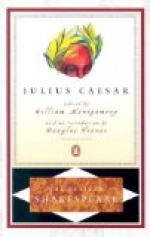|
This section contains 1,570 words (approx. 6 pages at 300 words per page) |

|
SOURCE: "Julius Caesar," in Shakespeare and Social Class, Humanities Press International, Inc., 1988, pp. 144-48.
In the following excerpt, Berry observes that the importance of class in Julius Caesar is demonstrated by the fact that even though Brutus "is wrong all of the time, " he is nevertheless deferred to and his decisions are respected due to his patrician authority which is based on his noble ancestry.
Julius Caesar
Titus Andronicus has total power over his children. In Julius Caesar, that power is exercised, as it were, from beyond the grave. The later play shows a fascinating shift of angle to address the same phenomenon, patriarchy. Sons are everywhere in Titus Andronicus—Titus's, Tamora's, and Aaron's. In Julius Caesar, nobody has children. Dramatically they are excluded from the cast, and the opening procession draws attention to Calphurnia's infertility. To compensate for their lack of children, the Romans have an abundance...
|
This section contains 1,570 words (approx. 6 pages at 300 words per page) |

|


